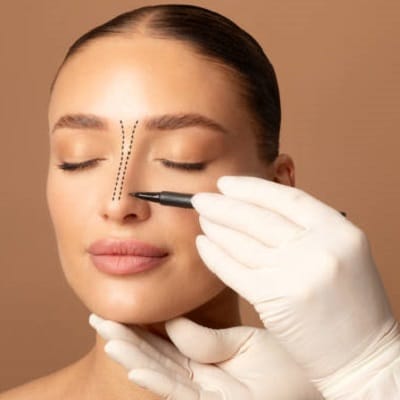
Rhinoplasty in Islamabad, also referred to as a “nose job,” is a revolutionary cosmetic procedure that modifies more than just the external features of the nose. Effective communication is an often overlooked factor critical to the success of rhinoplasty treatments, even though a specialist’s surgical skills are unquestionably necessary.
The interaction between the patient and the surgeon before, during, and after rhinoplasty is integral to achieving aesthetically pleasing results and ensuring the patient’s satisfaction and psychological well-being.
Preoperative Communication:
Before the scalpel touches the skin, a comprehensive understanding of the patient’s expectations, concerns, and motivations is imperative. Clear and open communication during the preoperative phase helps the surgeon comprehend the patient’s aesthetic goals and ensures realistic expectations.
Patients may bring pictures or references to illustrate their desired nose shape, but the surgeons are responsible for managing these expectations within the realm of surgical possibilities.
Moreover, discussing the patient’s medical history, previous surgeries, and any underlying health conditions is crucial to assess the feasibility and safety of the procedure. A thorough examination of the nasal structure, skin type, and overall facial harmony is necessary for the surgeon to provide personalized recommendations.
Informed Consent:
The communication process extends to the legal aspect of the surgery through informed consent. Surgeons must explain the details of the procedure, potential risks, and expected outcomes to the patient. This protects the surgeon from legal ramifications and fosters trust and transparency in the doctor-patient relationship.
During the Surgery:
Effective communication doesn’t stop once the patient is on the operating table. In modern rhinoplasty procedures, surgeons often employ advanced techniques, such as computer imaging and 3D simulations, to communicate the anticipated postoperative results visually. This reassures the patient and enhances the surgeon’s ability to meet the patient’s expectations.
Maintaining open communication with the surgical team is crucial for a smooth and efficient operation. Coordination between the surgeon, anesthesiologist, and nursing staff ensures that the procedure is conducted precisely and that patient safety is prioritized.
Postoperative Communication:
The period following a rhinoplasty procedure is as critical as the surgery itself. Clear and thorough communication during recovery is essential to address concerns, manage expectations, and guide the patient through the healing process.
Patients must be informed about the expected postoperative symptoms, such as swelling, bruising, and discomfort. Clear instructions on postoperative care, including medication schedules, activity restrictions, and follow-up appointments, contribute to a successful recovery. Surgeons should be readily available for questions or concerns during this crucial phase.
Addressing Complications and Revisions:
Despite meticulous planning and execution, complications may arise in rhinoplasty procedures. Effective communication is crucial when discussing these issues with the patient. Timely and transparent communication about potential complications, such as infection, bleeding, or unsatisfactory results, allows the patient to be mentally prepared and actively participate in decision-making.
In cases where the desired outcome is not achieved or the patient expresses dissatisfaction, communication becomes even more critical. Surgeons should approach revision procedures carefully, ensuring the patient understands the reasons for the revision, potential outcomes, and associated risks.
Continuous Improvement:
Communication in rhinoplasty is a dynamic process that extends beyond individual surgeries. Surgeons must embrace continuous improvement by seeking patient feedback, evaluating their performance, and staying updated on advancements in the field. Patient testimonials, reviews, and constructive criticism provide valuable insights that can enhance the overall patient experience.
All Summed Up!
In rhinoplasty, effective communication is the linchpin that holds together the intricate elements of surgery, patient expectations, and emotional well-being. From the initial consultation to postoperative care, every interaction shapes the patient’s experience and contributes to the procedure’s success.
At SKN Cosmetic Clinic Islamabad, Surgeons who prioritize clear, compassionate, and transparent communication are more likely to achieve optimal surgical outcomes and foster lasting relationships built on trust and mutual understanding. Rhinoplasty, when approached with a commitment to effective communication, becomes a harmonious collaboration between surgeon and patient, resulting in a beautifully transformed nose and a satisfied and confident individual.




